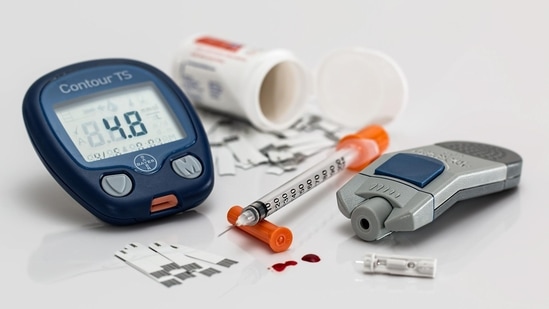How technology is changing the way you can manage diabetes: AI to wearable devices | Health
Diabetes is a chronic condition that occurs when the body loses its ability to keep the level of sugar in the blood under control. According to Dr Richa Chaturvedi, senior consultant in endocrinology at Indraprastha Apollo Hospitals, technology is significantly transforming diabetes management and enhancing patient care and clinical practices. Also read | World Diabetes Day 2024: From Maheep Kapoor to Nick Jonas, 7 celebrity-approved tips to manage diabetes
Digital tools helping doctors and patients
Digital health tools, artificial intelligence (AI), and wearable devices are leading the way in transforming the landscape for both patients and clinicians, adds Dr Varsha Kachroo, associate consultant – endocrinology at Yatharth Hospital.
Gerald Jaideep, CEO of Medvarsity Online highlights how the healthcare industry is witnessing a transformation from periodic check-ups to continuous, data-driven care management.
“Digital tools are not just streamlining routine tasks, they’re fundamentally changing how healthcare professionals make clinical decisions and engage with patients,” he says, adding, “Our recent survey of over 3,000 diabetologists and endocrinologists revealed that 90 percent of them consider upskilling in these new technologies crucial for improving patient outcomes. This isn’t simply about adopting new tools, it’s about reimagining the entire care delivery model. The future of diabetes management lies at the intersection of clinical expertise and technological innovation.”
He adds that as healthcare professionals embrace continuous glucose monitoring, AI-driven predictive analytics, and telemedicine platforms, we are moving towards a more proactive, personalised approach to patient care.

Proactive approach to managing diabetes
According to Dr Richa Chaturvedi, continuous glucose monitors (CGMs) and insulin pumps are at the forefront of this change. She says, “CGMs provide real-time glucose readings, allowing patients to track their levels continuously throughout the day. This technology reduces the need for frequent fingerstick tests and helps patients avoid dangerous fluctuations in blood sugar levels. Insulin pumps, which deliver insulin steadily throughout the day, further simplify diabetes management by minimising the need for multiple daily injections.”
She says the integration of these technologies into diabetes care is akin to creating an ‘artificial pancreas’. Closed-loop systems combine CGMs with insulin pumps to automatically adjust insulin delivery based on real-time glucose data: this innovation not only improves glycemic control but also significantly reduces the risk of complications like diabetic ketoacidosis, a serious condition that can arise from poorly managed diabetes, says Dr Richa Chaturvedi.
Moreover, telemedicine and mobile health applications are expanding access to care and enabling better patient education. Dr Richa Chaturvedi says, “These tools allow for remote monitoring and communication between patients and healthcare providers, fostering a proactive approach to managing diabetes. Patients can share their glucose data through apps, facilitating timely adjustments to their treatment plans without needing to visit a clinic.”
As technology continues to evolve, it promises to make diabetes management more personalised and efficient. Innovations such as smart insulin pens and digital health apps are helping patients calculate dosages and track their health metrics more effectively, adds Dr Richa Chaturvedi. These advancements not only empower patients but also enhance the overall quality of care provided by healthcare professionals

Benefits of technology in diabetes management
Dr Varsha Kachroo says, “Enhanced patient engagement: Real-time data and personalised feedback foster greater patient engagement and accountability. Improved glycemic control: Technology enables tighter glucose control, helping patients stay within target ranges and reduce complications. Convenient and accessible care: Tools like telemedicine and RPM provide greater accessibility and convenience, enhancing care continuity.”
Technological innovations you should know
Dr Varsha Kachroo also highlighted the technological innovations in diabetes management:
1. Continuous Glucose Monitors (CGMs): CGMs enable real-time glucose monitoring, offering patients constant insight into their blood sugar levels without the need for frequent finger pricks. By capturing data trends and glucose fluctuations, CGMs empower patients and clinicians to make timely adjustments to treatment plans, improving glycemic control and reducing the risk of complications.
2. Smart Insulin pens and pumps: Advanced insulin delivery devices, such as smart insulin pens and insulin pumps, allow for precise insulin dosing. These devices can track dosage history, recommend adjustments, and in some cases, sync with CGMs to deliver insulin automatically based on real-time data, mimicking the function of a biological pancreas.
3. Mobile health applications: Diabetes management apps offer digital support, guiding patients on nutrition, calorie counting, exercise, medication adherence, and glucose tracking. Many apps feature AI-driven algorithms that analyze user data, provide personalized insights,and encourage behavioral changes that can positively impact blood sugar levels.
4. Telemedicine and Remote Patient Monitoring (RPM): Telemedicine enables virtual consultations, allowing patients to connect with healthcare providers from home, which is particularly beneficial for those with limited access to in-person care. RPM systems facilitate the sharing of glucose data, activity levels, and other metrics, allowing for proactive intervention based on remote analysis.
5. Artificial intelligence and predictive analytics: AI models analyze patterns in a patient’s data to predict hypoglycemia or hyperglycemia risk, providing an opportunity for preemptive intervention. Predictive analytics also aid in personalized treatment plans by identifying which interventions yield the best outcomes based on patient history.
Challenges and considerations
⦿ Cost and accessibility: Not all patients may have access to advanced technology due to cost and availability.
⦿ Data security: Handling patient data securely remains critical as more data is digitized and shared across platforms.
⦿ Technology literacy: Some patients may struggle with the complexity of devices or apps, necessitating patient education and support.
Disclaimer: This article is for informational purposes only and not a substitute for professional medical advice. Always seek the advice of your doctor with any questions about a medical condition.

